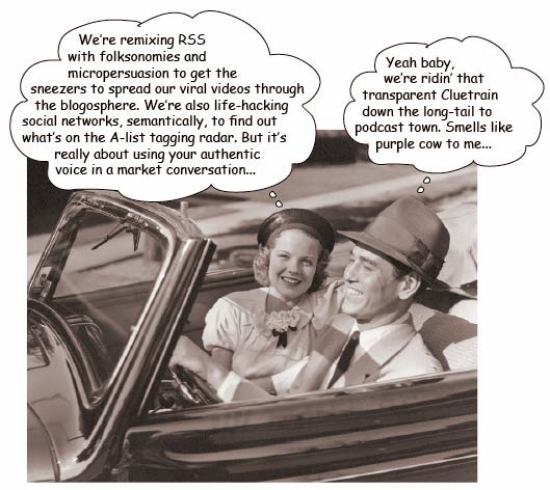
I’m no fan of using jargon or buzzwords when communicating with various audiences, whether it’s journalists or consumers in whatever medium. Indeed, when I looked over the list of PR buzzwords compiled by Mynt PR in an admittedly unscientific survey, it got me thinking about what is a buzzword and why we all use them — even though we know better.
According to my handy Webster’s Collegiate (yeah, a real one made of trees), buzzword is defined as “a word or phrase used by members of some in-group, having little or imprecise meaning but sounding impressive to outsiders.”
Given that definition, there are quite a few words on Mynt’s list that probably shouldn’t be there.
Granted, I’ll give you “cutting edge,” “best practice,” “earth-shattering” and “core competencies” as examples of empty expressions that are sprinkled into PR product like glitter on a second-grader’s valentine. But there are other words on the list that I would take exception to.
For instance, “cloud,” as in “cloud computing.” For one thing, the term has gained wide acceptance and recognition, and to eschew its use would require adding a paragraph or two to explain what it means. Same thing with “long tail,” which refers to those highly specialized or niche blogs that have small but fiercely loyal or expert audiences. That’s not even the whole explanation, which involves a graph and distribution from highest to lowest audience numbers and would take much more than a paragraph to do it justice by way of explanation.
My point here is, while buzzwords are devoid of meaning, many commonly used terms and phrases that are dubbed buzzwords simply because they are commonly used actually function as a form of shorthand. They sum up in a word or phrase a complex idea that would require a lot of explanation and exposition to convey the same amount of meaning. When I read “social media,” it immediately connotes to me the whole of what that term represents, from Twitter to Facebook to YouTube and everything in between and beyond. Granted, the term gets used an awful lot, but that’s because everybody’s doing it and talking about it, not because it’s meaningless.
On the other hand, “groundbreaking” is meaningless, though it does convey that something is happening for the first time in a tired, cliched way.
It’s important to be careful of the words we use and, where possible, eschew the buzz, the jargon and the cliche in favor of meaning, clarity and perfect prose.
Do you have some real buzzword pet peeves? Share them in comments.

I hate the word “actually”. Maybe I’m getting old…40 now…but if you tune your ears to hear it, you will begin noticing it all the time. Here is an example…
Me: “How are you today?”
Them: “Actually…I’m really good”.
The word means NOTHING!!…”Actually…dinner was great, I am actually on vacation…He was actually standing on the car”, and on and on.
Whatever is said means exactly the same thing w/o the word “actually”.
Thankfully I have annoyed my kids enough to the point where they (actually) don’t use the word anymore.